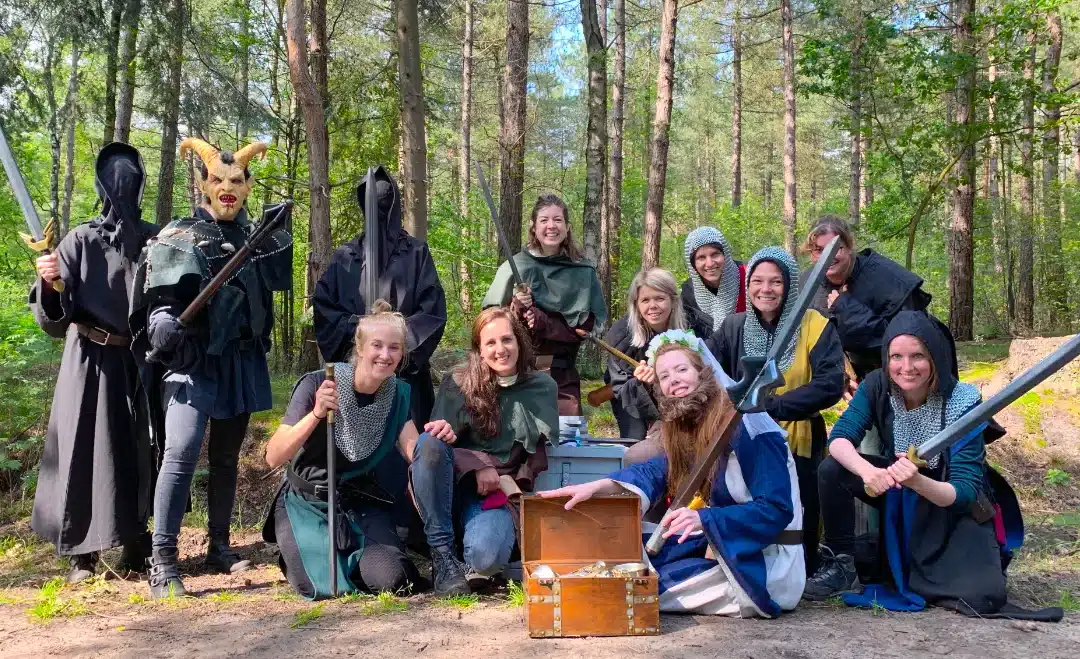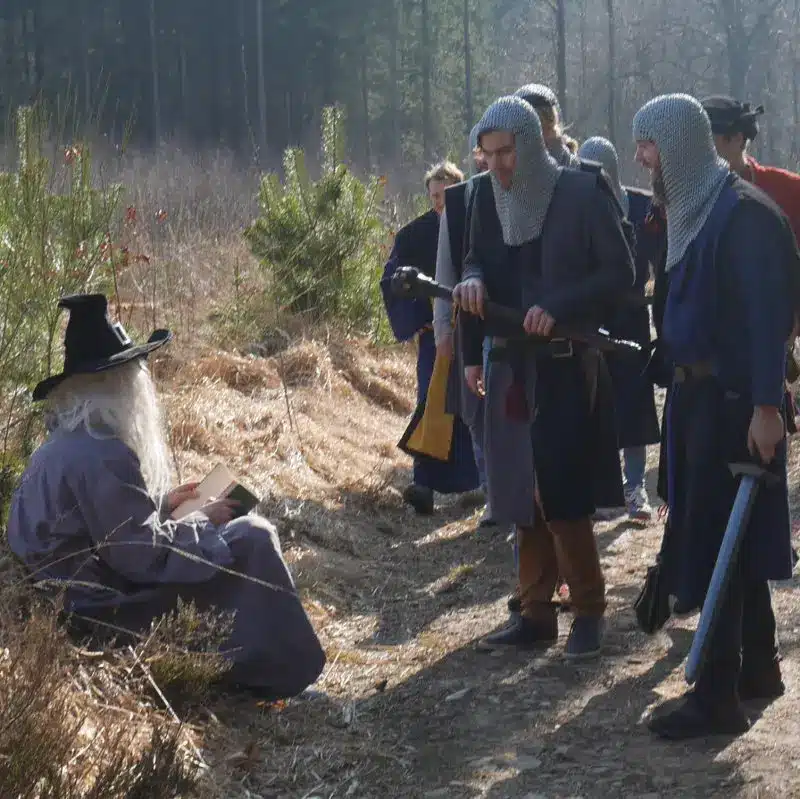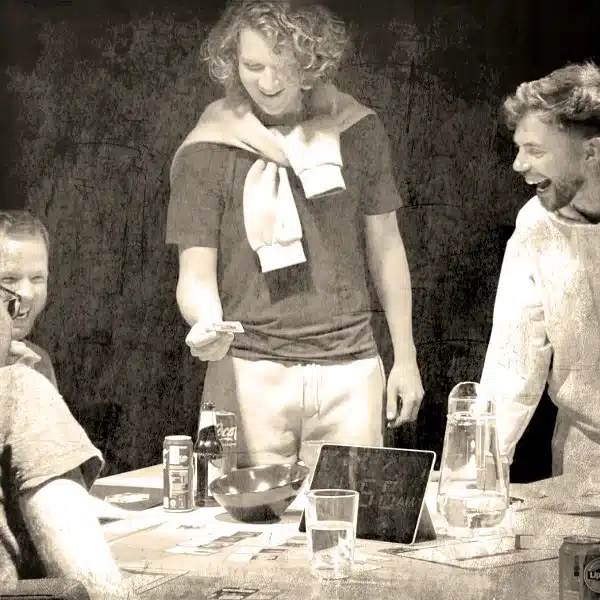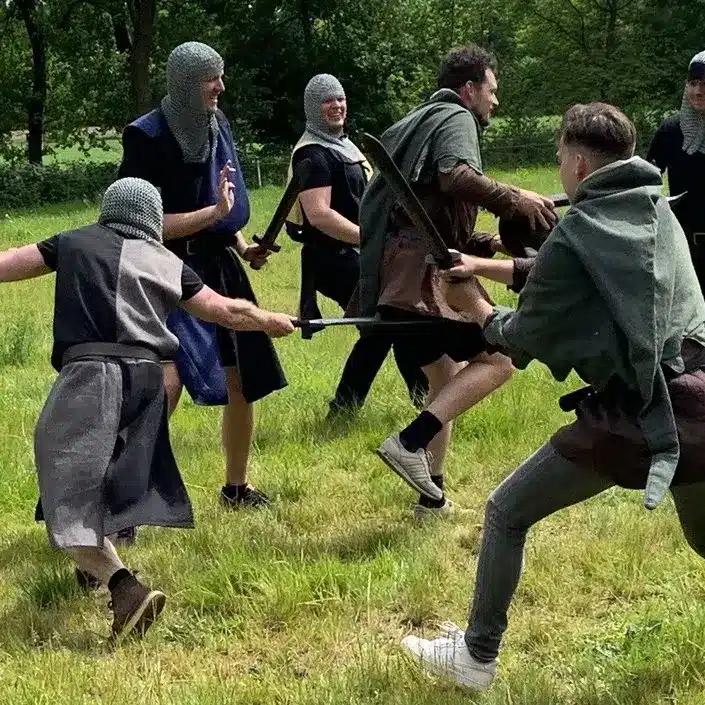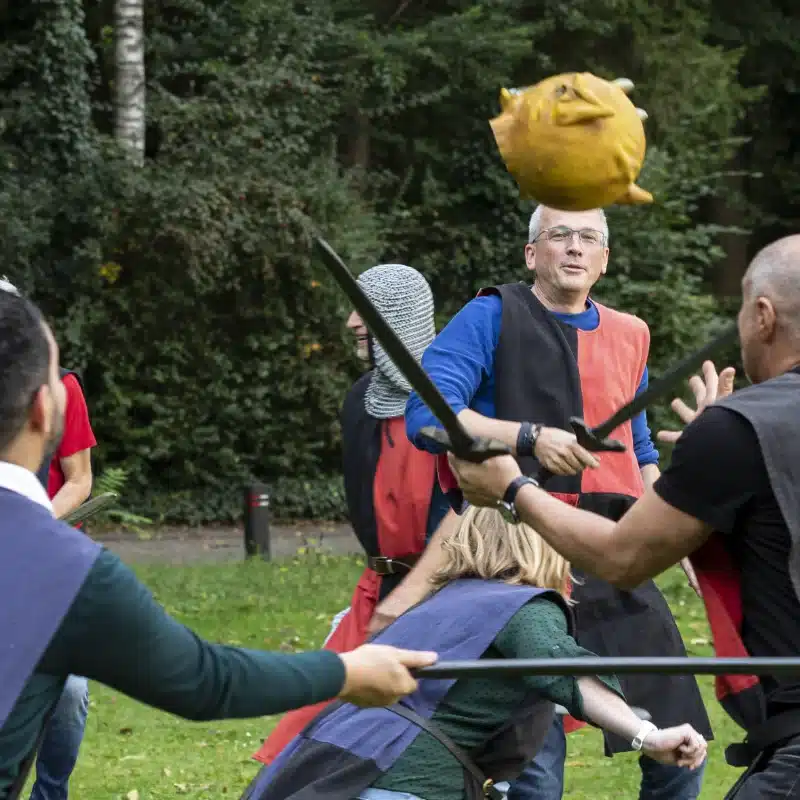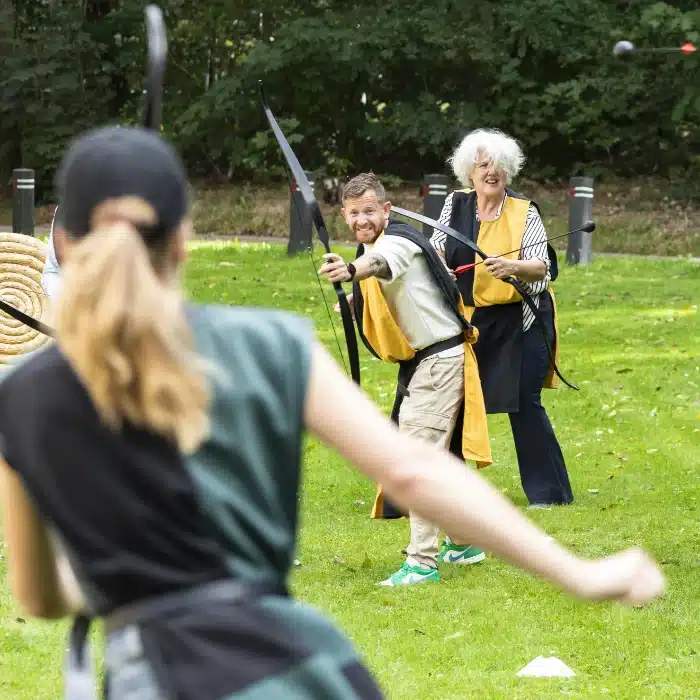Live action Role-Playing is a phenomenon, a medium, a hobby, a form of pastime and, for some, a source of inspiration. We first explore what the definition of Larp might be. 'Larp' has many definitions. Every Larp organization has at least one.
Larp, the game
'A Larp (Live Action Role-Playing) or simply "live role-playing" is essentially a kind of improvisational stage without an audience; it involves building a character in (often) a fictional world and acting out this character including costume without a pre-written script. Most people who know larp from newspaper articles or TV will no doubt be most familiar with fantasy larps, which take place in worlds like those you see in the Lord of the Rings movies, but there are many genres that are all enthusiastically played by larpers.'
Another definition comes from the general leaflet for Malatië Adventures (1998):
'Larp is an improvisational play (without an audience) with a theme where getting absorbed in the story is central. You invent a role for yourself: a character with a background and your own character traits. Anything goes, as long as it fits the theme in which the adventure takes place. Then you react from your role to the situations that arise during the adventure. In order for everything to be fair and run smoothly, there are some rules of the game that everyone abides by.'
The medium 'Larp'
Larp is a medium like a book, theater, play, film or television program. Larp can be used to tell a story, experience a character or alternate reality, or solve a puzzle plot. In addition, Larp can be seen as a form of art: participants in a Larp event collectively create an experience that touches them emotionally.
'Art: a subjective expression of a human being that either expresses the artist's imagination or feelings in a creative activity or is a creation that evokes a feeling or imagination in the observer, for the purpose of producing an original, sensory perceptible (or otherwise imaginable) expression or product with a particular emotional value or representation.'
'Larp' as a transformative work form
The following definition is aimed at the professional market. Other aspects are brought out here to better reflect the perceptions of the non-Larper.
'Larp (Live action Role-Playing) is a medium, like a book or theater, in which the participants are both players and each other's audience. On the basis of game rules and game mechanisms, the participants play a role with which together they explore an alternative reality and try out the possibilities offered by this game world. For the participants, immersing themselves in the role provides insights into their own abilities, into their fellow players or into the phenomenon that is being told with a story. These insights lead to a change in behavior, attitude or way of thinking. In a safe, fun and playful way, Larp proves it can deal with serious issues.'
Nordic Larp vs. Traditional Larp
The insights in the book "Live action Role-Playing, the game, the drama and the experience" are for the traditional Larper. The term 'Traditional Larp' comes from discussions allegedly held during Knudepunkt 2014, an annual Larp congress in Scandinavia. People there were looking for a new term for 'Nordic Larp,' as their Larp style had now been adopted by countries around the world. Someone came up with the proposal ‘Progressive Larp’, om zo het experimentele, het continue zoeken naar vernieuwing door Larpers wereldwijd te omvatten. Dat betekent automatisch dat wat niet progressief is, per definitie ‘Traditional Larp’ moet zijn.
Another characteristic of traditional Larp is that the organizers and the game system and game world of the Larp event are heavily influenced by table top roleplaying games. Hier staat vaak het spelsysteem voorop, gevolgd door de achtergrondwereld en het scenario. Zaken als interactief spel, personageontwikkeling en immersie krijgen minder aandacht.
The term "traditional" does not imply a value judgment about the type of game. The majority of all live role-playing events produced in the Netherlands over the last twenty-five years fall under the definition of traditional Larp.
Type Larp en type 'Larper'
One of the first Knudepunt books mentions a classification of type of game and type of players: 'The Three Way-model’ (Bøckman, 2003).
- The Gamist is a participant who values solving the plot. Or if you are an organizer: creating a plot. The challenges can be tactical battles, intellectual mysteries, political games, etc. The player will try to solve the problem she encounters and the organization will strive to make the challenges fair and solvable;
- The Dramatist is a participant who values how good “in game" (‘in game’)actions create a nice storyline. Different types of stories can provide satisfaction in the process, depending on the participant's taste. This can range from pulp to believable drama. The end result is a good story with special moments;
- The Immersionist To truly begin to understand Larp, it is not enough to delve into theories about the game. This highlights only the gammist's view of Larp. Those sides of Larp as experienced by the Dramatist and Immersionist should also be considered. For the Dramatist, there may be deepening in the areas of theater, drama, storytelling, screenwriting, etc. The Immersionist may delve into role-survival, sociology, psychology, history and futurology.
The model helps you determine your own gaming preferences as a player. You can then look for a LARP organization that offers your type of game. Unfortunately, LARP organizations in the Netherlands do not (yet) use this classification system.
Larping at IntoTheMirror
IntoTheMirror (and larpen.nl) offers accessible Larps for non-Larpers, which include all aspects of traditional Larp. We focus on DramatistsWe offer hooks for the GamistBecause our games are short, facilitating Immersionists is not our priority.
The Black-Box Murder Mysteries or Jubensha's are once again more focused on Gamists and, to a lesser extent, Dramatists because of the puzzle content in these games. The Murder Mystery Larps are somewhere between Dramatists and Gamists, as they focus primarily on achieving personal game goals and less on the murder mystery.

